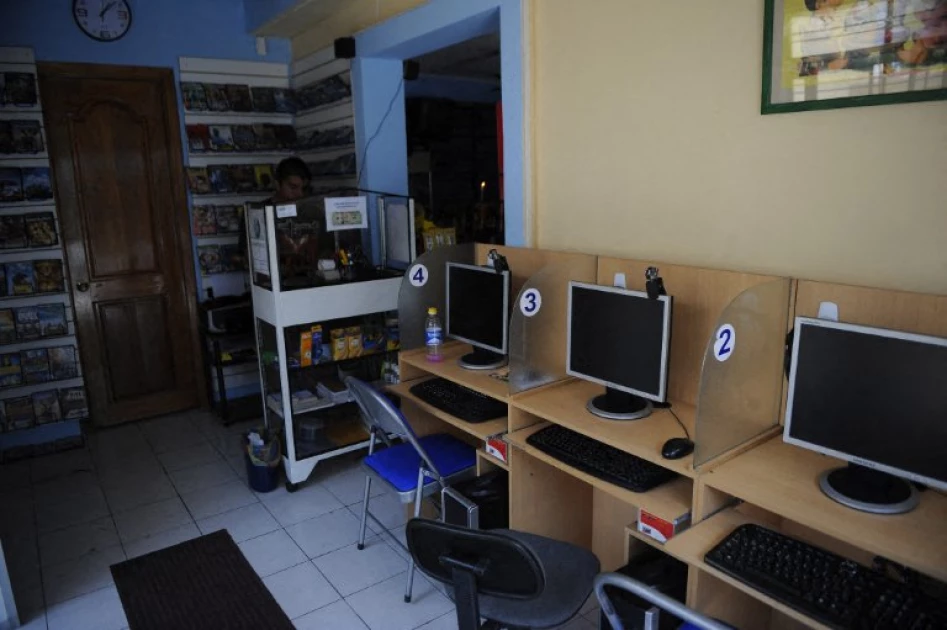Gov’t wants all cybercafés fitted with CCTV surveillance, users identified

File photo of a cybercafé. (Photo by AFP)
The government seeks to license all internet cafés in Kenya afresh and introduce new controls in what it says are efforts to streamline regulation and spur the growth of the local ICT sector.
Currently, the Communications Authority of
Kenya (CA) licences cybercafés under the Public Communication Access Centre
(PCAC) category.
In new proposals the regulator published in
December, CA notes the government’s initiative to provide free public Wi-Fi
hotspots across Kenya through the ICT Authority but also observes “a very large
number of entities operating as cybercafés countrywide that pose regulatory
challenges that closely mirror those of the ordinary vendor licence category.”
In its Review of the Telecommunications
Market Structure 2024, the communications watchdog proposes that PCACs providing
internet browsing services be licensed under the ‘Internet Cafés’ category.
The cafés will be required to have, among
others, logging-in software – which records events, actions, and messages that
occur when a computer program is running – and CCTV surveillance on the
premises.
“This licence shall be re-introduced, but
as a CLASS Licence with licence terms and conditions set by the authority
including provisions for record keeping, logging-in software, CCTV
surveillance, as well as identification of persons accessing the service
point/facility,” CA says.
President William Ruto’s government plans
to install 25,000 public Wi-Fi hotspots, set up 1,450 ‘Digital Village Smart
Hubs and Studios’ and three data centres as part of its ‘National Digital
Superhighway Programme’.
“The current review is therefore aimed at
removing certain market barriers identified over time, in line with the authority’s
mission of enabling regulation,” CA adds.
Cybercafé use was popular in the 2010s
among digital-savvy Kenyans for internet browsing and other services like
document processing.
However, their use has declined considerably
due to increased internet penetration in urban and rural areas and the rise of
smartphones.
In 2023, for instance,
CA data showed that for the first time, the number of smartphones used in the
country was higher than that of feature phones.
The regulator said there
were 32,631,924 smartphones in Kenya between July and September 2023, while
feature phones were 32,040,928.
At the same time, CA seeks to tighten rules
governing the sale of low-power telecommunications terminal equipment such as
mobile phones and vehicle tracking devices.
Currently, selling these gadgets requires a
Vendor Licence from CA, which is free of regulatory fees.
“Despite the ease of entry in this market
segment, most vendors operate without a Licence, oftentimes importing and
selling sub-standard communication devices, thereby raising several concerns
due to non-compliance with local standards, such as the requirement for a
unique International Mobile Equipment Identity (IMEI),” CA says.
“The large number of vendors makes it
nearly impossible to control the sale of substandard devices in the market,” it
adds
As such, the authority wants a Telecommunication
Equipment Distributor (TED) licence introduced for all wholesale suppliers and importers
of communications equipment, and foreign manufacturers that wish to distribute devices
locally.
“Manufacturers domiciled in Kenya will,
however, not be required to obtain any licence, but will be required to sell to
only licensed TEDs. Any local manufacturer that wishes to distribute
communications equipment to local vendors will be required to obtain a TED
Licence,” CA says.
TED (distributor) licences will only cover
equipment supply and sale, and the provision of after-sales support. It will
not include installation and maintenance activities.
Per the proposals, every distributor will
ensure all equipment they sell has been approved; importers shall ensure all devices
they import or manufacture comply with industry standards in Kenya.
CA also wants to convert the current vendor
licence into a ‘CLASS’ Communications Equipment Vendor (CEV) Licence for mobile
device sellers.
Now, phone distributors will pay a
Ksh.5,000 application fee, an initial licence fee of Ksh.250,000 and an annual
operating fee of Ksh.120,000, or 0.4 per cent of their gross annual turnover,
whichever is higher.
The proposals are subject to public
scrutiny and stakeholders have until January 23 to submit their
comments.
CA plans to implement the regulations in
the 2025/2026 financial year.
The new proposals follow guidelines CA introduced last year requiring phone manufacturers, importers and retailers, and mobile
network operators to upload the International Mobile Equipment Identity (IMEI)
numbers of all locally assembled and imported mobile phones sold in Kenya from
January 1, 2025, to ensure tax compliance.
Want to send us a story? SMS to 25170 or WhatsApp 0743570000 or Submit on Citizen Digital or email wananchi@royalmedia.co.ke
Comments
No comments yet.



Leave a Comment